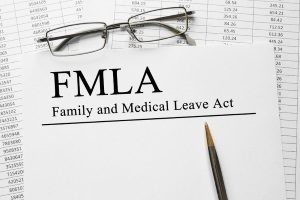What Is The Family And Medical Leave Act?
 The Family and Medical Leave Act (FMLA) is a United States labor law established in 1993. It requires employers to provide employees with job-protected and unpaid leave for qualified medical and family reasons. These include pregnancy, adoption, foster care, placement of a child, personal or family illness, or family military leave. This act is administered by the Wage and Hour Division of the United States Department of Labor. For more information of the Family and Medical Leave Act speak to an employment law defense attorney.
The Family and Medical Leave Act (FMLA) is a United States labor law established in 1993. It requires employers to provide employees with job-protected and unpaid leave for qualified medical and family reasons. These include pregnancy, adoption, foster care, placement of a child, personal or family illness, or family military leave. This act is administered by the Wage and Hour Division of the United States Department of Labor. For more information of the Family and Medical Leave Act speak to an employment law defense attorney.
Why Was In Enacted?
This law was created to balance the demands of the workplace as well as the needs of families. It was originally introduced to Congress in 1984 but didn’t receive approval until 1993. The Act was mostly created to protect women in the workforce when they become pregnant and have to take time off to care for their children. However, it wasn’t intended to focus only on that specific issue as it also includes protection for unpaid leave for serious medical conditions and the right to take time off to care for immediate family members.
How Does It Work?
Eligible employees can take up to 12 workweeks of unpaid leave during any 12-month period to attend to the serious health conditions outlined previously. These conditions can affect the individual, parent, spouse, or child of the employee. Upon their return to work it is expected that they will return to the same position with the same pay and benefits, but if that is not possible they will receive a new position of equal value in terms of pay and benefits.
Eligibility
To be eligible under this act the employee must have worked at the business for at least 12 months and have worked at least 1,250 hours over the past 12 months. The company the employee works for must employ at least 50 employees within a 75-mile radius. The Family and Medical Leave Act covers both public and private-sector employees, but it does exclude certain categories like elected officials and their personal staff. The reason for the employee’s unpaid leave must affect them personally, their spouse, their children, or their parents. There are some exceptions, such as the right to care for a service member with a serious illness or injury.
Non-Eligible Workers And Types Of Leave
 The federal Family and Medical Leave Act does not apply to workers in businesses with fewer than 50 employees, part-time workers who have worked fewer than 1,250 hours within the 12 months preceding the unpaid leave, time off to care for seriously ill elderly relatives (other than parents) unless they were acting in loco parentis at the time the worker turned 18, time off to care for pets, time off to recover from a short-term or common illness like a cold, or to care for a family member of a short-term or common illness, and workers who need time off for routine medical care.
The federal Family and Medical Leave Act does not apply to workers in businesses with fewer than 50 employees, part-time workers who have worked fewer than 1,250 hours within the 12 months preceding the unpaid leave, time off to care for seriously ill elderly relatives (other than parents) unless they were acting in loco parentis at the time the worker turned 18, time off to care for pets, time off to recover from a short-term or common illness like a cold, or to care for a family member of a short-term or common illness, and workers who need time off for routine medical care.
Rights During Leave
The purposes of leave under the FMLA Act are to care for a new child (whether for birth, adoption, or placement of a child in foster care), to care for a seriously ill family member (spouse, son, daughter, or parent), to recover from a worker’s own serious illness, to care for an injured service member in the family, to address qualifying exigencies arising out of a family member’s deployment, and 26 workweeks of leave during a single 12-month period to care for a covered servicemember with a serious illness or injury if the eligible worker is the service member’s spouse, son, daughter, parent, or next of kin.
Child care leave should be taken in one lump unless an employer agrees otherwise. If a mother and father have the same employer, they must share the leave, which means that if the employer chooses their rights are halved.
Right To Return To Job
After unpaid leave in most situations, the employee is allowed to return to their job. There is an exception for this if the employee is in the top 10% of highest paid employees and their return could cause substantial and serious economic injury to the operations of the employer. Upon the employees return, they have the right to the same group of health insurance benefits, return to the same position of one of equal value in terms of pay and benefits, protection of benefits while on leave; and occasional leave for doctor’s appointment for a chronic condition, treatment, or temporary periods of incapacity.
If an employee is within the top 10% of highest-paid employees, the employer is not required to return them to their original position (or one of equal value in terms of pay and benefits) if it’s determined that their return to their original position could cause serious financial stress on the operations of the employer. The employer is required to provide notice, however, there is no established time frame that this notice must be delivered by.
How The Act Has Changed
 In 2008 there were amendments made to the FMLA for military family members that extended the coverage to next of kin and adult children. In 2010, the FMLA clarified that the definition of “son and daughter” in the original act included employees who are assuming the role of caring for a child receive parental rights to family leave regardless of the legal or biological relationship. It also specified that an employee who intends to share the parenting of a child with a same-sex partner is protected under FMLA for unpaid leave to bond with that child.
In 2008 there were amendments made to the FMLA for military family members that extended the coverage to next of kin and adult children. In 2010, the FMLA clarified that the definition of “son and daughter” in the original act included employees who are assuming the role of caring for a child receive parental rights to family leave regardless of the legal or biological relationship. It also specified that an employee who intends to share the parenting of a child with a same-sex partner is protected under FMLA for unpaid leave to bond with that child.
In 2015 there was an amendment that ruled that the definition of “spouse” applied to employees in same-sex marriages or common-law marriages entered into the state where those statuses are legally recognized. This is true regardless of the state in which the employee works or resides. This essentially means that if the couple is married legally in a state, they receive protection under FMLA regardless of what state they reside or work in. The FMLA Act continues to be a serious issue having arisen during the 2016 Presidential campaign. One main issue surrounding the FMLA concerns people’s demands that it be expanded to include paid leave as well as unpaid leave. Many are hopeful for the likelihood of the FMLA experiencing some changes in the future. Speak to an employment law defense attorney for more information and services regarding the Family and Medical Leave Act.

